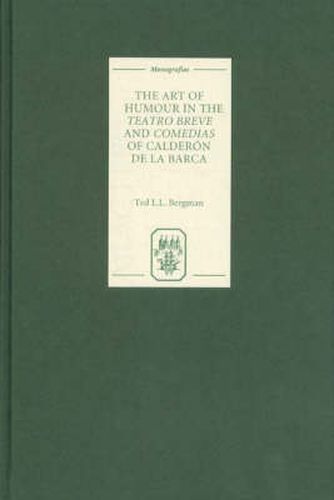Readings Newsletter
Become a Readings Member to make your shopping experience even easier.
Sign in or sign up for free!
You’re not far away from qualifying for FREE standard shipping within Australia
You’ve qualified for FREE standard shipping within Australia
The cart is loading…






Contrary to popular belief, Pedro Calderon de la Barca had a sense of humour. This book examines the integral and often essential use of humour in his works, looking beyond his persistent reputation as a dour and dogmatic representative of the Spanish canon. Calderon’s teatro breve (featuring mojigangas, entremeses and jacaras) thrives on comic techniques and situations that poke fun at everything and everybody, from aspiring nobility to people facing execution; and he parodies and satirizes genres and themes such as the auto sacramental or the infamous ‘honour code’. His irreverence and desire for the audience’s laughter are not just expressed in his teatro breve: the very same humorous techniques and situations, and even entire small works themselves, are found in his comedias, blurring and often eliminating the distinction between ‘major’ and ‘minor’ genres. Calderon proves that the ‘complementary’ teatro breve need not live a separate existence, and that its presence within the comedia itself offers untold opportunities for novelty, diversion and criticism. By turning jokes into a dramatic art form and vice versa, Calderon has much to teach us about the presence, role and functioning of humour in all of Spanish Golden Age theatre. TED L.L. BERGMAN is Professor of Spanish Language and Culture, Soka University of America. Al contrario de lo que generalmente se cree, Pedro Calderon de la Barca tenia un sentido de humor. Esta monografia analiza el papel integral y muchas veces esencial desempenado por el humor en las obras de Calderon. Su teatro breve, por ejemplo, se deleita en tecnicas humoristicas y situaciones comicas en las que se burla de todos y de todo, desde los pordioseros hasta los condenados a muerte. Incluso satiriza y parodia generos tales como el auto sacramental y temas como el codigo de honor. Pero la irreverencia de Calderon y su deseo de hacerle reir al publico no se limita a su teatro breve; en efecto las mismas tecnicas y situaciones comicas - y hasta la totalidad de una obra breve - se incluyen tambien en las comedias. La destreza demostrada por Calderon al convertir los chistes en una obra de arte nos obliga a considerar de nuevo el uso del humor en el teatro del Siglo de Oro.
$9.00 standard shipping within Australia
FREE standard shipping within Australia for orders over $100.00
Express & International shipping calculated at checkout
Contrary to popular belief, Pedro Calderon de la Barca had a sense of humour. This book examines the integral and often essential use of humour in his works, looking beyond his persistent reputation as a dour and dogmatic representative of the Spanish canon. Calderon’s teatro breve (featuring mojigangas, entremeses and jacaras) thrives on comic techniques and situations that poke fun at everything and everybody, from aspiring nobility to people facing execution; and he parodies and satirizes genres and themes such as the auto sacramental or the infamous ‘honour code’. His irreverence and desire for the audience’s laughter are not just expressed in his teatro breve: the very same humorous techniques and situations, and even entire small works themselves, are found in his comedias, blurring and often eliminating the distinction between ‘major’ and ‘minor’ genres. Calderon proves that the ‘complementary’ teatro breve need not live a separate existence, and that its presence within the comedia itself offers untold opportunities for novelty, diversion and criticism. By turning jokes into a dramatic art form and vice versa, Calderon has much to teach us about the presence, role and functioning of humour in all of Spanish Golden Age theatre. TED L.L. BERGMAN is Professor of Spanish Language and Culture, Soka University of America. Al contrario de lo que generalmente se cree, Pedro Calderon de la Barca tenia un sentido de humor. Esta monografia analiza el papel integral y muchas veces esencial desempenado por el humor en las obras de Calderon. Su teatro breve, por ejemplo, se deleita en tecnicas humoristicas y situaciones comicas en las que se burla de todos y de todo, desde los pordioseros hasta los condenados a muerte. Incluso satiriza y parodia generos tales como el auto sacramental y temas como el codigo de honor. Pero la irreverencia de Calderon y su deseo de hacerle reir al publico no se limita a su teatro breve; en efecto las mismas tecnicas y situaciones comicas - y hasta la totalidad de una obra breve - se incluyen tambien en las comedias. La destreza demostrada por Calderon al convertir los chistes en una obra de arte nos obliga a considerar de nuevo el uso del humor en el teatro del Siglo de Oro.